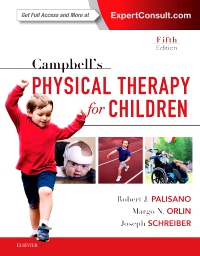
Campbell's Physical Therapy for Children Expert Consult - Pageburst eBook on VitalSource, 5th Edition
Elsevier eBook on VitalSource

Now $98.79
Get all the pediatric physical therapy background and guidance you need with Campbell’s Physical Therapy for Children Expert Consult, 5th Edition. Insightful and comprehensive coverage walks you through all aspects of working with children, including: decision making, screening, development, motor control and motor learning, the impairments of body function and structure, and the PT management of pediatric disorders. Like the previous bestselling editions, this edition also follows the practice pattern categories of the Guide to Physical Therapist Practice and uses the IFC model of the disabling process as it presents up-to-date, evidence-based coverage of treatment. New to this edition are a number of added and extensively revised chapters — covering topics such as tests and measures, autism spectrum disorder, pediatric oncology, and the neonatal intensive care unit — to keep you at the cutting edge of the latest issues and best-practices. Finally, with it’s wealth of online resources and learning aids, you’ll have all the tools and support you need to tackle every aspect of pediatric physical therapy!
Newer Edition Available
Campbell's Physical Therapy for Children - Elsevier E-Book on VitalSource
-
- Focus on the International Classification of Function, Disability, and Health (ICF) of the World Health Organization (WHO) emphasizes activity rather than functional limitations and participation rather than disability
- Incorporation of practice pattern guidelines from the Guide to Physical Therapist Practice, 2nd Edition sets the standard for physical therapy practice
- Comprehensive reference offers a thorough understanding of all aspects of pediatric physical therapy, including: decision making, screening, development, motor control, and motor learning, the impairments of body function and structure, and the PT management of pediatric disorders
- Expert authorship and editors lend their experience and guidance for on-the-job success
- Variety of user resources to enhance study include review questions, critical questions, and additional resources and activities
- Questions and exercises offer great preparation for the APTA’s Pediatric Specialist Certification Examination
-
- NEW! Revised chapter on motor development and control now closely examines the when, how, why, and what of developing motor skill and how it contributes to effective physical therapy
- NEW! Chapter on children with autism spectrum disorder (ASD) covers the characteristics of ASD, the diagnostic process, program planning, and evidence-based decision making for children with ASD
- NEW! Chapter on pediatric oncology addresses the signs and symptoms of pediatric cancers, the most common medical interventions used to treat these diseases, the PT examination, and common therapeutic interventions
- NEW! Chapter on tests and measures offers guidance on how to effectively use tests and measures in pediatric physical therapy practice
- NEW! Extensively revised chapter asthma offers more detail on the pathology of asthma; the primary and secondary impairments of asthma; the impact on a child’s long term health and development; pharmacological management; and more
- NEW! Revised chapter on the neonatal intensive care unite better addresses the role of the physical therapist in the neonatal intensive care unit
- UPDATED! Full color photos and line drawings clearly demonstrate important concepts and clinical conditions that will be encountered in practice
- NEW! Expert Consult platform provides a number of enhancements, including a fully searchable version of the book, case studies, videos, and more
- NEW! Revised organization now includes background information — such as pathology, pathophysiology, etiology, prognosis and natural evolution, and medical and pharmacologic management — as well as foreground information — such as evidence-based recommendations on physical therapy examination strategies, optimal tests and measurement, interventions, patient/caregiver instruction, and more
- NEW! Additional case studies and videos illustrate how concepts apply to practice
-
Section 1: Understanding Motor Performance in Children
1. Evidence-Based Decision Making in Pediatric Physical Therapy
2. Tests and Measures
3. Motor Development and Control
4. Motor Learning: Application of Principles to Pediatric Rehabilitation
5. Musculoskeletal Development and Adaptation
6. Physical Fitness during Childhoold and Adolescence
Section 2: Management of Musculoskeletal Conditions
7. Juvenile Idiopathic Arthritis
8. Spinal Conditions
9. Congenital Muscular Torticollis and Cranial Deformation
10. Arthrogryposis Multiplex Congenita
11. Osteogenesis Imperfecta
12. Muscular Dystrophy and Spinal Muscular Atrophy
13. Limb Deficiencies and Amputations
14. Orthopedic Conditions
15. Sports Injuries in Children
Section 3: Management of Neurologic Conditions
16. Developmental Coordination Disorder
17. Children with Motor and Intellectual Disabilities
18. Cerebral Palsy
19. Perinatal Brachial Plexus Injury
20. Spinal Cord Injury
21. Acquired Brain Injuries: Trauma, Near Drowning, and Tumors
22. Myelodyspasia
23. Children with Autism Spectrum Disorder
Section 4: Management of Cardiopulmonary Conditions
24. Children Requiring Long-term Mechanical Ventilation
25. Cystic Fibrosis
26. Asthma: Multisystem Implications
27. Thoracic Surgery (Cardiac)
Section 5: Special Settings and Special Considerations
28. Serving Infants, Toddlers, and Their Families: Early Intervention Services under IDEA
29. The Education Environment
30. Pediatric Oncology
31. The Special Care Nursery
32. Transition to Adulthood for Youth with Disabilities
33. Assistive Technology
34. Development and Analysis of Gait


 as described in our
as described in our 